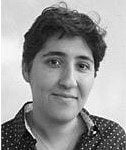Dissecting the role of the tumor microenvironment in human leukemia
Live Webinar: 28 June 2017, 4-5pm CET
Webinar objectives:
- Learn about the cutting-edge science and career paths of the most successful young scientists in Europe
- Ask questions to better develop your own career plan
- Learn from the questions of peers
- Benefit from the knowledge of speakers on how to apply for ERC grants
Format:
- 25 min science presentation
- 10 min presentation of the career path
- 25 min Q&A
About the speaker:
Dr. Hind Medyouf studied Biology and Biochemistry at the University Denis Diderot, Paris, France. As a PhD at the Institute Curie in France, she identified the pro-oncogenic effects of the focused on the role of calcineurin/NFAT signaling in the pathogenesis of T-cell acute lymphoblastic leukemia. After completing her PhD thesis, Hind moved to Vancouver (Canada) to join the group of Andrew Weng at the Terry Fox Laboratory. As a Human Frontier Science Program Fellow, she continued working on deregulated signaling pathways in T-ALL. Subsequently she was awarded a long-term EMBO postdoctoral fellowship to join the team of Andreas Trumpp in Heidelberg (Germany) where she studied the fundamental biological properties of hematopoietic stem cells and used this knowledge to gain novel insight on the mechanisms underlying the emergence of pre-leukemic syndromes, such as myelodysplastic syndrome (MDS), with a particular focus on the role of the bone marrow microenvironment. In 2014, she obtained a José Carreras Career award and an ERC Starting grant and established her own research laboratory at the Institute of Tumor Biology and Experimental Therapy in Frankfurt, Germany. Her research currently interrogates the complex biology of hematologic malignancies by investigating both intrinsic and extrinsic mechanisms that control the fate of the hematopoietic stem/progenitor cells (HSPCs) responsible for disease propagation.

Abstract
Similar to their healthy counterpart, malignant hematopoietic stem cells (HSCs) reside in a highly complex and dynamic cellular microenvironment in the bone marrow (BM). This environment provides key regulatory signals that tightly control cardinal features of HSCs, which are essential to maintaining cellular homeostasis and blood regeneration throughout life. Our working program is based on the concept that, in addition to hematopoietic intrinsic changes, perturbations of the BM niche inevitably affect normal hematopoiesis and contribute to the pathogenesis of hematopoietic malignancies, both in mice and men.
In particular, we are interested in the role of mesenchymal niche cells, which we believe act in a concerted manner with (epi)-genetically altered hematopoietic cells to promote the development and progression of hematological malignancies, including pre-leukemic syndromes, such as myelodysplastic syndromes (MDS). We use primary patient material and various in vivo modeling strategies to identify and interrogate the functional relevance of deregulated niche factors in malignant hematopoiesis. Our overarching goal is to exploit these interdependencies to hamper the growth of diseased clones and/or improve the function of residual normal hematopoietic stem cells.
In addition to our work on the microenvironment, we recently uncovered that even early stage malignancies, such as MDS, exhibit a tremendous clonal heterogeneity, which in turn has important implications in terms of disease evolution and individual patient’s responses to therapy. Follow up studies are now focusing on the interplay between microenvironment and clonal dominance.
Top 5 publications
- Mossner M, Jann JC, Wittig J, Nolte F, Fey S, Nowak V, Obländer J, Pressler J, Palme I, Xanthopoulos C, Boch T, Metzgeroth G, Röhl H, Witt SH, Dukal H, Klein C, Schmitt S, Gelß P, Platzbecker U, Balaian E, Fabarius A, Blum H, Schulze TJ, Meggendorfer M, Haferlach C, Trumpp A, Hofmann WK, Medyouf H*, Nowak D* (2016). Mutational hierarchies in myelodysplastic syndromes dynamically adapt and evolve upon therapy response and failure. Sep 1;128(9):1246-59.
- Medyouf H, Mossner M, Jann JC, Nolte F, Raffel S, Herrmann C, Lier A, Eisen C, Nowak V, Zens B, Müdder K, Klein C, Obländer J, Fey S, Vogler J, Fabarius A, Riedl E, Roehl H, Kohlmann A, Staller M, Haferlach C, Müller N, John T, Platzbecker U, Metzgeroth G, Hofmann WK, Trumpp A, Nowak D. (2014) Myelodysplastic Cells in Patients Re-program Mesenchymal Stromal Cells to Establish a Transplantable Stem Cell-Niche Disease Unit. Cell Stem Cell. Jun 5;14(6):824-37.
- Medyouf H*, Gusscott S, Wang H, Wai C, et al. (2011) High Level IGF1R Expression is Required for Leukemia-Initiating Cell Activity in T-ALL and is Supported by Notch Signaling. J Exp Med. 208(9): 1809-22. * Co-corresponding author.
- Medyouf H, Gao X, Armstrong F, Gusscott S, et al. (2010) Acute T-cell Leukemias Remain Dependent on Notch Signaling Despite PTEN and INK4A/ARF Loss. Blood. 115(6): 1175-84.
- Medyouf H, Alcalde H, Berthier C, Guillemin MC, et al. (2007) Targeting calcineurin activation as a therapeutic strategy for lymphoid malignancies. Nat Medicine. (13): 736-741.